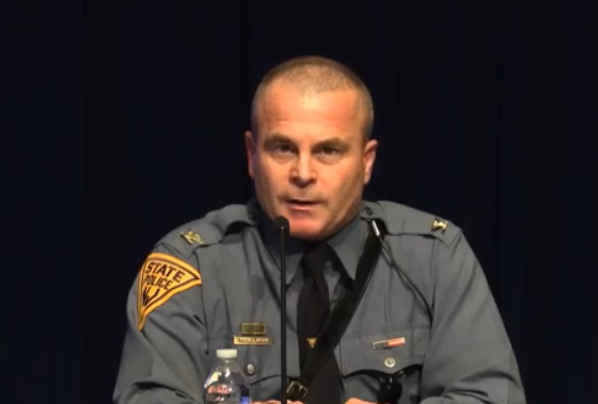Callahan Makes My Day

In his daily briefings to provide updates on the Covid-19 outbreak and announce what steps the state contemplates to combat it, Gov. Phil Murphy is flanked by Health Commissioner Judy Persichilli and State Police Superintendent Col. Pat Callahan.
The format has become familiar by now:
*Murphy provides an overview of the state’s efforts, reveals the latest infection rates and deaths, reinforces the stay at home and six feet apart advice, and repeats his “we’re all in this together and we’ll all come out of it together” pep talk.
*Persichilli speaks to hospitalization levels, demographic breakdown of those infected, and projects the ability of the state’s medical facilities to absorb the rising patient load.
*Callahan provides information on field hospitals, testing sites, protective equipment stocks and enforcement of the governor’s emergency directives.
The briefings have demonstrated government at its best --- candid, informative, forthright and in control of a situation unlike any the state has experienced in modern history.
Persichilli is knowledgeable, in full command of her role in the state’s response, and unhesitant in answering questions. Her calm yet serious demeanor reinforces her competence, her faith in her ability and her confidence that the most serious public health crisis in a century will be met and conquered.
It is, though, an unusual role for the man in command of New Jersey’s 3,000-member State Police force. Law enforcement is pressed into service in times of natural or man-made disasters to protect life and property and bring down the hammer on those who would use the confusion and chaos to harm the innocent.
It is rare for a uniformed force under arms to become so deeply and intimately involved in medical issues or matters of public health.
Callahan’s participation in the daily briefings is striking. While he and Persichilli have decidedly different roles to fill, the greatest difference is a simple one --- Persichilli can’t put you in jail; Callahan can.
If a Hollywood casting director sent out a call for the quintessential Irish cop, Callahan would show up at his door.
With a classic police officer’s buzzcut and impeccable uniform, Callahan resembles a state police recruiting poster. All that’s missing is a pair of mirror sunglasses.
His presentations are no-nonsense recitations of the tasks delegated to him. He is brief but not rudely curt, direct and well-informed.
His is a command presence, but he also clearly recognizes the lane of responsibility he occupies and scrupulously remains in it. He understands the chain of command and precisely where he fits in it.
When addressing what the governor refers to as “compliance issues” --- a euphemism for people who disregard his executive orders --- Callahan is at his articulate best.
His voice is even as he recounts arrests, summonses and warnings issued, and sensitive situations de-fused.
He is non-judgmental, but in discussing some of the more egregious violations, a “what the hell were they thinking” inflection creeps into his voice.
He was delegated by Murphy the authority to commandeer medical equipment from private sources if necessary to be put to use in hospitals and other medical facilities to help overcome shortages.
A bit of advice to anyone who possesses such equipment: If Callahan shows up at your door and asks to turn it over, you’d be wise to comply.
Murphy has performed admirably in dealing with the Covid-19 crisis. He is comfortable in his leadership role and is acutely aware of his responsibility to offer reassurance to a nervous and fearful public.
The sympathy he and Persichilli express over the reported deaths is genuine and heartfelt. Their desire and willingness to put all their energies and resources into overcoming the pandemic and preventing additional deaths is evident in their voices.
Had they any choice, the three ---Murphy, Persichilli and Callahan --- would have preferred not to be in their current roles.
They were thrust into them by a crisis none could have predicted.
They’ve risen to the challenge; they’ve become the face of a government focused on what is government’s highest responsibility --- the safety and security of its people.
Carl Golden is a senior contributing analyst with the William J. Hughes Center for Public Policy at Stockton University.






I had to read this post twice just to make sure it was real - who doesn't love a good 'feel good' story? Thank you for sharing this inspiring tale of kindness!
Unfortunately, Callahan violated his Constitutional Oath of Office to Uphold, Support and Defend the United States Constitution (which includes the SECOND AMENDMENT RIGHT TO KEEP AND BEAR ARMS) when he declared that gun & ammo stores, gun ranges, et al. were 'non-essential' businesses. The right to purchase firearms for human right to self-defense is protected under the 2nd Amendment. Since Callahan violated his Oath, it constitutes OFFICIAL MISCONDUCT. He must resign under this malfeasance and misfeasance. His attempt to obstruct, block and interfere with CONSTITUTIONAL RIGHTS TO KEEP AND BEAR ARMS under the SECOND AMENDMENT parallels the 1938 Nazi Weapons Law. All Super. Callahan has to do is go to the Jews for the Preservation of Firearms Ownership (www.jpfo.org) and read the excerpts from the book "GUN CONTROL--Gateway to Tyranny" and he will find NJ gun control law and his own actions are identical to the Nazi Weapons Law. This is inimical to the Constitution, and he violated his Oath in following and implementing anti-American Nazi laws.. He must resign immediately for violations of the following NJ criminal statutes: OFFICIAL MISCONDUCT (NJSA 2C:30-2), OFFICIAL DEPRIVATION OF CIVIL RIGHTS (NJSA 2C:30-6) AND PATTERN OF OFFICIAL MISCONDUCT (NJSA 2C:30-7).
What is rare, unusual or striking about the Director of Emergency Management being involved in a State emergency? Do your homework.